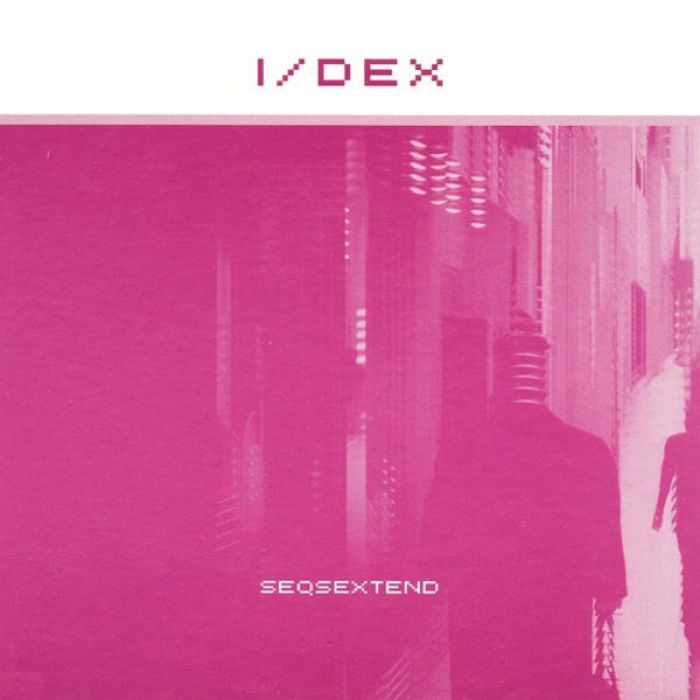Seqsextend by I/Dex (Review)

Funny story about this disc… When it arrived, I perused the various press materials that accompanied it, which included statements such as “I/DEX… creates the most pleasing audio environment for you to exist in.” My curiosity piqued — after all, one can never have too many pleasing audio environments — I stuck this into the stereo and got settled in, only to be confronted with one of the ugliest examples of glitch I’ve ever heard. Soothing sounds didn’t flow from my speakers: they limped forth, battered and bruised to within an inch of their lives, cut apart and stitched back together by bursts of static discharge and razor-sharp hiss.
At first, I assumed this was intentional and that things would smooth out as the album progressed. But after about a minute or so of the sonic barrage, I steeled myself and buckled down, mentally preparing myself for another 60 minutes or so of the stuff. Then I looked up at my stereo and noticed the time display was stuttering about as much as the sounds. Turns out, my CD player wasn’t playing the CD properly. Breathing a sigh of relief (because anything else would’ve been preferable to what I was hearing at that moment), I fished the CD out of my stereo and took it to work the next day, where it played just fine in my computer. But to this day, my trusty Aiwa mini system won’t play this CD, but instead just sits there sputtering and gasping.
So once I finally got the disc playing and could actually listen to the music uninterrupted by hardware issues, what was it like? The term “glitch” can and will be used to describe Seqsextend, but that term feels so cold and inhuman to describe the warm, lush soundscapes that Vitaly Harmash (the man behind the laptop) creates throughout these 13 songs. Oval’s Systemisch this most certainly isn’t. Easy points of reference might include Pole and even Pan-American, and at first, I have to admit that I found I/DEX’s music a bit too much on the familiar side.
Initially, Seqsextend seemed a bit monotonous, perfect background music for coding and designing to be sure, but nothing really more. But Harmash is a master at subtlety, at creating pieces of music that seem a bit derivative or ordinary at first. But after repeated listens, the layers of shifting, hypnotic sound begin to part themselves, revealing far more depth than was initially perceived. I soon found that, as I took breaks from staring at my computer and leaned back in my chair with Seqsextend floating in over my headphones, it was quite delightful to close my eyes and just let Harmash’s warm, soothing sounds wash over and surround me.
“Rand” begins with flecks of static being immersed in a swirling kaleidoscope of sounds that wouldn’t be out of place on a Tujiko Noriko recording. Soon, a pitter-pattering beat kicks in and other sounds — childlike bleeps and bloops, tiny chimes — begin drifting in until it resembles one of Múm’s softer moments. It’s almost disappointing that the Valtysdóttir sisters don’t pop up by the track’s halfway point. Almost.
“.Doc” swirls about, with several hypnotic loops of processed digitalia winding and weaving their way between your headphones, while the reverberating, dub-inspired synths of “Ciq” swim deep beneath layers of glitch-riddled waves of static and hiss. The sensation on this track is of floating just beneath the ocean’s surface, and of watching the way shafts of sunlight play as they trickle down into the depths.
Some of the disc’s biggest and best surprises come at the very end, during the last three tracks. Here, Harmash strips away much of his sonic layering, revealing bare, tundra-like plains of sound, populated only by the ghostliest of voices. However, a haunting Boards Of Canada-like melody begins winding its away across the barrenness of “Eunet,” infusing the album with new emotion. Emotion which comes to fruition during “Comm,” one of the disc’s most melodic and accessible tracks. And as is the case with much of disc, one can toss out easy comparisons (in this case, Boards Of Canada meets Worm Is Green) and yet I/DEX’s music still sounds fresh and unique.
The disc winds down in every possible way with the melancholy “Outsert,” as sad, lonely synth melodies and delicate, shimmering tones are slowly shifted about by languid basslines and short pulses of rhythm programming. The beautiful sounds slowly fade away, leaving one feeling quite content and yet also wishing that the sounds would linger just a little bit longer.
As much as I’ve described, or attempted to describe I/DEX’s music, there is much that I still feel like I haven’t adequately gotten a handle on. I’m almost tempted to shelve this review and give the CD another couple of listens before giving it another go. What primarily elevates Seqsextend above being just another glitch exercise is that there’s a nigh-living, breathing quality to its songs. Terms like “synth,” “laptop,” “IDM,” and “glitch” feel woefully inadequate to really describe the sounds you hear. Rather, the terms you feel more inclined to use — terms like “gurgling,” “bubbling,” “gasping,” “churning,” “breathing,” “cooing” — suggest organic, even human qualities.
Strangely enough, I find it easy to compare I/DEX’s glitch with Robert Rich’s “glurp” (those strange, alien environmental recordings that Rich uses to give his ambient music it’s earthy, organic feel). Although they work in vastly different arenas of sound, both artists display an uncanny knack for breathing warmth and spirit into their music, something that is especially poignant in I/DEX’s case considering the electronic origins of his music.